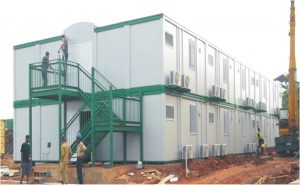 In Nigeria today, it is no news that there is gradually becoming a scarcity or shortage in housing as a result of the rapid population explosion. The population is growing at a rate that might some day render some people homeless in the nearest future. It is not that houses are not being built, but the rate at which new buildings are built doesn’t compare to the rate at which the population is exploding or growing. According to an expert advice, the solution to this present dilemma and deficit in housing is the adoption of a prefab technology.
In Nigeria today, it is no news that there is gradually becoming a scarcity or shortage in housing as a result of the rapid population explosion. The population is growing at a rate that might some day render some people homeless in the nearest future. It is not that houses are not being built, but the rate at which new buildings are built doesn’t compare to the rate at which the population is exploding or growing. According to an expert advice, the solution to this present dilemma and deficit in housing is the adoption of a prefab technology.
What is a prefab?
A prefab is short for prefabricated building, and is a type of building that is constructed by assembling already manufactured components. These components are manufactured offsite – in the factory, and when needed can be transported to the desired location and matched together. This prefab technology is unlike the conventional building method that requires building materials to be transported to the site, where you now carry out the assembly.
Like the name prefabricated, all units of the building like the roofs, walls, doors, windows, floors and so on are fabricated in a factory. This is different for the conventional building practices that involves transporting to site all the materials needed such as cement, bricks, steel, sand, timber and other construction requirements.In prefabricated construction, the only thing done on site is the foundation.
Benefits of Prefab Buildings
There are benefits that come with prefab buildings, some of which are:
Flexibility:
With prefab buildings, the specifications – whether interior or exterior can be easily altered and adaptable when the need arises. The components and units for prefab construction come in adaptable designs sizes and types. These flexibility makes it possible for you to easily add or improve modules even after initial construction.
Speed:
Unlike the conventional or tradition construction, prefab cuts down on the time taken to get a building together and ready for use. Since the bulk of the construction work is done offsite, a prefab only takes a small fraction of the time it would have taken.
Cost:
Compared to traditional builds, prefab buildings are more cost-effective. The techniques involved in the building process not less compared to the conventional process, and as such a lesser cost is required.
Environment:
Obviously, the onsite activities are not much and therefore no much harm is posed on the environment. Less energy is consumed during the process, and more sustainable methods are employed.
Prefab buildings are gradually becoming popular in Nigeria. Particularly, in last few years, the construction industry has featured experts coming out and strongly endorsing the technology. With the way the country’s population is excalating, sooner than later, people are going to be render homeless. The only way out, or will I say, the best way out is embracing the prefab technology. They have proven to be very economic and still efficient. This way, there will be more than enough houses to accommodate our population.

Bob